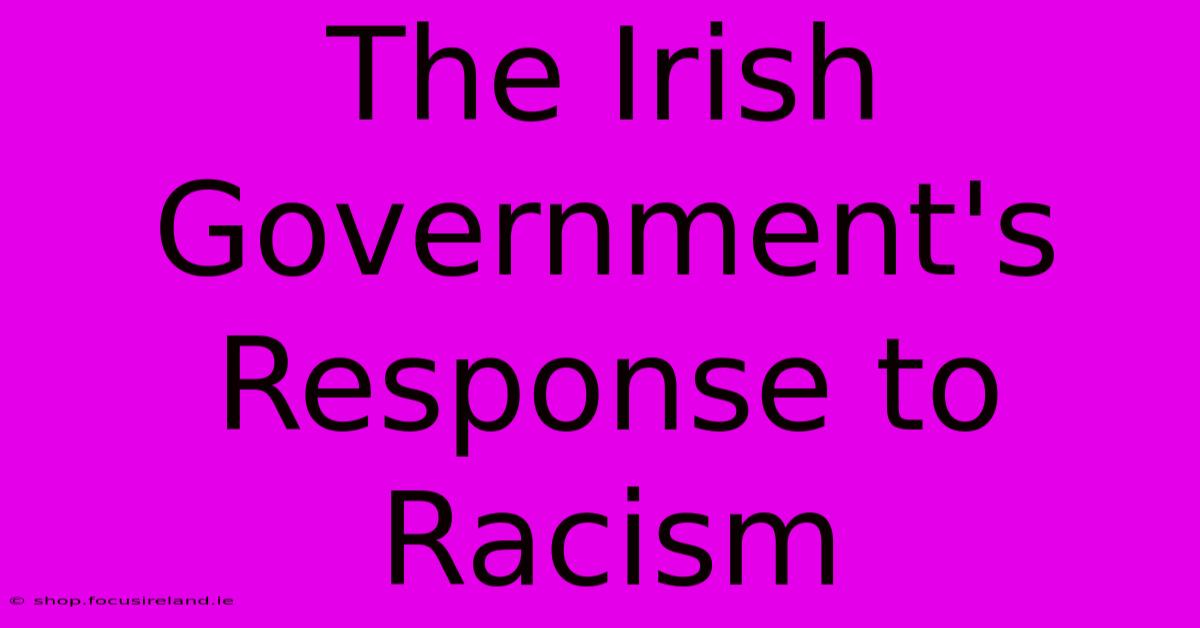The Irish Government's Response To Racism

Table of Contents
The Irish Government's Response to Racism: A Complex and Evolving Picture
Ireland, like many nations, grapples with a complex history and present-day reality surrounding racism and discrimination. While often perceived as a homogenous society, the country boasts a diverse population, and with that diversity comes the challenge of addressing systemic and individual acts of prejudice. This article examines the Irish government's response to racism, highlighting both progress and areas requiring further attention.
Acknowledging the Past: A Necessary First Step
For many years, discussions of racism in Ireland were often muted, overshadowed by a narrative of national homogeneity. However, recent years have witnessed a growing acknowledgment of the historical and ongoing impact of racism on minority ethnic communities. This shift is crucial, as confronting the past is essential for building a more equitable future. Understanding the historical context – including the legacy of colonialism and immigration policies – is vital to formulating effective anti-racism strategies.
The Role of Institutional Racism
The Irish government has begun to acknowledge the role of institutional racism in perpetuating inequalities. This recognition, however, must translate into concrete action. Reports and inquiries have highlighted disproportionate representation of minority ethnic groups in areas such as the criminal justice system and employment. Addressing these systemic issues requires more than simply acknowledging the problem; it necessitates fundamental reforms within these institutions.
Current Government Initiatives: A Mixed Bag
The Irish government has implemented several initiatives aimed at combating racism and promoting equality. These include:
-
Legislation: Laws prohibiting discrimination on the grounds of race are in place. However, enforcement and the effectiveness of these laws remain a key area of concern. Stronger enforcement mechanisms and accessible reporting mechanisms are crucial for ensuring meaningful change.
-
Funding for anti-racism organizations: The government provides funding to various organizations working to combat racism and promote intercultural understanding. While this is a positive step, consistent and adequate funding is vital to support the crucial work of these organizations.
-
National strategies: National strategies on integration and equality have been developed. The success of these strategies hinges on effective implementation, monitoring, and evaluation. Regular reviews and adjustments are necessary to ensure they remain relevant and effective in addressing evolving challenges.
-
Education initiatives: Efforts are being made to integrate anti-racism education into the school curriculum. This is a vital long-term strategy for fostering a more inclusive and equitable society. However, the curriculum must be comprehensive, inclusive, and effectively implemented across all schools.
Challenges and Areas Needing Improvement
Despite the initiatives undertaken, significant challenges remain:
-
Data Collection: Comprehensive and reliable data on racism and discrimination are essential for informed policymaking. The lack of robust data collection mechanisms hinders a complete understanding of the extent of the problem and the effectiveness of government interventions.
-
Enforcement and Accountability: Weak enforcement of anti-discrimination laws leaves many victims without redress. Mechanisms for accountability, including independent oversight bodies, are necessary to ensure effective enforcement.
-
Addressing Systemic Racism: Tackling systemic racism requires a multifaceted approach that goes beyond individual acts of prejudice. This includes addressing inequalities in areas such as housing, employment, and healthcare.
-
Community Engagement: Meaningful engagement with minority ethnic communities is essential for developing effective anti-racism policies. Government initiatives must be informed by the lived experiences of those most affected by racism.
Conclusion: A Work in Progress
The Irish government's response to racism is a work in progress. While progress has been made in acknowledging the issue and implementing various initiatives, significant challenges remain. Addressing racism effectively requires a sustained and multifaceted approach that includes robust data collection, effective enforcement of existing laws, and meaningful engagement with minority ethnic communities. Only through sustained commitment and collaborative effort can Ireland build a truly inclusive and equitable society for all its citizens.

Thank you for visiting our website wich cover about The Irish Government's Response To Racism. We hope the information provided has been useful to you. Feel free to contact us if you have any questions or need further assistance. See you next time and dont miss to bookmark.
Featured Posts
-
Uncover Irelands Hidden Golf Gems Your Map Awaits
Mar 29, 2025
-
Find Your Perfect Tipperary B And B Browse Now
Mar 29, 2025
-
Discover Ireland A First Timers Roadmap
Mar 29, 2025
-
Kathy Ireland Diamond Euro Chair Investment In Comfort
Mar 29, 2025
-
Your Career In Ireland Starts Here Civil Service Jobs
Mar 29, 2025
